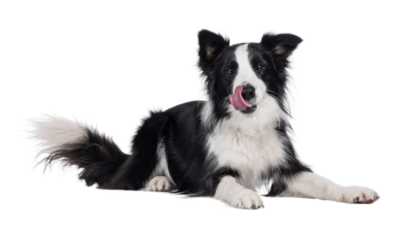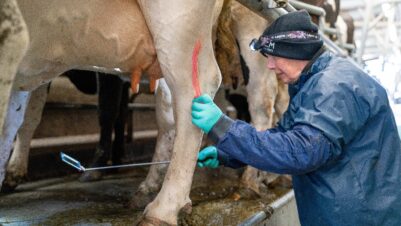OLIVER GARDEN AND BARBARA GLANEMANN ARE ON A MISSION to seek out and eliminate treason within the ranks of dogs and cats that visit their clinic at the Royal Veterinary College’s Queen Mother Hospital for Animals.
It’s not the animals themselves that are rebelling, but their white blood cells that have turned against their own bodies in creating a wide spectrum of conditions, ranging from the uncomfortable to the potentially fatal.
The QMHA is believed to be the first veterinary clinic in the world to offer a dedicated service for the treatment of immune mediated diseases. Autoimmune conditions affect around one in 20 people in the developed world and similar diseases are increasingly being recognised as a cause of morbidity and mortality in companion animals.
The service was officially launched at the London Vet Show in November last year although the RVC has offered second and third opinions on cases referred by practices in the south-east for many years.
“But we have never badged it as an immune-mediated diseases clinic before. This is part of the RVC’s strategy of providing bespoke clinics for particular categories of diseases, rather than simply offering dog and cat referrals,” Prof. Garden explains.
Strength in depth
As the biggest veterinary teaching hospital in Europe, the QMHA offers strength in depth for its client practices. In addition to Prof. Garden and Dr Glanemann, the centre employs six other internal medicine clinicians as well as the full range of other medical specialties.
Clinical pathologists, radiologists, soft tissue surgeons and neurologists are among those who will often become involved in the management of this complex and frequently baffling group of diseases.
Autoimmune disease can affect any one or a multitude of body systems but the three most common presentations are animals with immune-mediated haemolytic anaemia, thrombocytopaenia and polyarthritis.
“None of these would be a major component of the caseload of typical first opinion practices, although you might certainly expect to see a case or two every month. But while they are not common, they are important because an affected animal may often tread a very thin line between life and death,” Prof. Garden says.
“They are also important from an animal welfare viewpoint. A patient with the inflamed joints that you see in immune-mediated polyarthritis is likely to be experiencing considerable pain.” Given that there are strong breed predispositions to autoimmune conditions, there is clearly a major genetic element to this group of diseases. But there is also evidence of a variety of environmental factors – viruses, parasites and vaccine treatment, etc. – that appear to trigger the initial response.
Deficiency in feline form
Cats are also susceptible to these conditions although there is much less known about the feline forms in general. Dr Glanemann is working to remedy that deficiency, having recently published a major study on feline IMHA that revealed the increasing importance of disease unrelated to feline leukaemia virus exposure.
So the disease has been thrown back into the basket of idiopathic conditions, which her colleague suspects is just a reflection of our current inability to identify the real trigger factors.
These conditions are challenging both to diagnose and treat. Prof. Garden, therefore, encourages first opinion practitioners to work where possible with their colleagues in referral centres like the RVC. The QMHA not only employs staff with substantial experience of dealing with these conditions but can also call immediately on the various advanced diagnostic technologies needed for a thorough case work-up.
Autoimmune diseases may also present traps for the unwary. He emphasises the importance of addressing any underlying problems before attempting to tackle the disordered immune system. So, for example, if the trigger factor is a bacterial condition, it would be unwise, and potentially fatal, to skip over an effective antimicrobial treatment before seeking to ratchet down the immune response with corticosteroids.
International group of immunologists
Prof. Garden has spearheaded an international group of veterinary immunologists working under the auspices of the American College of Veterinary Internal Medicine to identify best practice in the management of these conditions.
He chairs the haematology working group, which aims to reach a consensus position on the tests most appropriate in clinical practice for identifying clinical cases and ruling out secondary diseases.
In all, there are seven or eight such working groups, which will be discussing progress so far at the inaugural meeting in Denver in June of his brainchild: the nascent Veterinary and Comparative Clinical Immunology Society.
When working on diseases with a small and heterogeneous patient population, collaboration with other industry, university and private referral centres is usually the only way to recruit sufficient numbers of cases for statistically reliable results.
Any potential new therapies will need to be tested in cases of naturally occurring disease in client-owned animals. So the RVC pioneered the concept of a dedicated team of veterinary nurses, an integral part of the Clinical Investigations Centre, to organise clinical studies in companion animals, obtaining informed consent, arranging appointments for treatment, and liaising with the owner’s home practice, etc.
A 1993 graduate of the RVC, Prof. Garden spent a considerable portion of his early career working in human medical schools on both sides of the Atlantic before returning to his alma mater in 2004. As such he is familiar with the progress in dealing with the equivalent human conditions to those he is studying in dogs.
He is excited by the range of possibilities for improved treatment for autoimmune conditions that are under investigation by the human biotechnology industry – and he is optimistic that the benefits will be passed on to the veterinary sector.
But he emphasises that the ow of knowledge isn’t a one-way street. Autoimmune disease is one area that is ripe for exploration through the One Health approach and he is working, for example, with colleagues at Barts Cancer Institute in London on the parallels between non-Hodgkin lymphoma in people and the equivalent disorder in dogs.
“In this area, veterinary science is not behind the curve, as lamentably is often the case; we are moving in parallel with our colleagues in human medicine.
“Owing to the inbred nature of the pet dog population, we can potentially offer an excellent model for studies on human disease, as well as this work being important for our own veterinary patients, which is, of course, the reason we get out of bed every day.”










